
3 February 2025
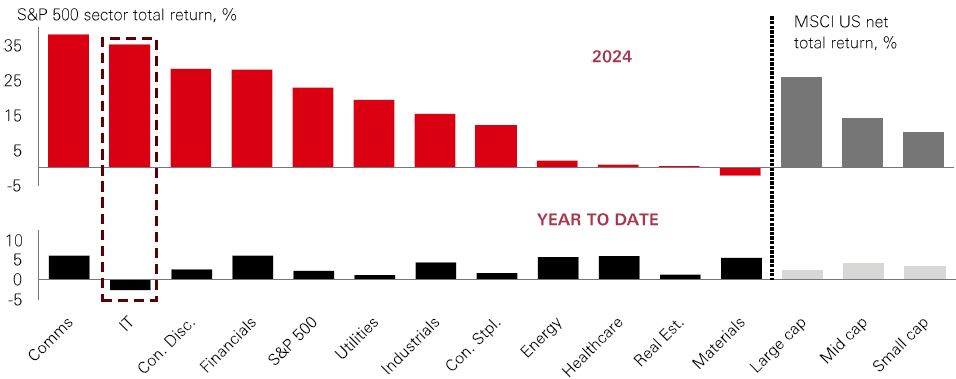
Last week saw a market wobble caused by the potential disruption of AI start-up DeepSeek to the US-dominated AI business model. It’s too early to argue for a big negative impact on AI capex or the wider US tech sector, and many software names could be poised to benefit. Access to cheaper AI could even create an explosion in demand – we call this “the Jevons Paradox in action”. While equity volatility spiked last Monday, markets have regained lost ground.
Yet, last week’s developments added significant uncertainty in a sector priced for perfection. With Q4 2024 earnings season under way – and big tech profits in focus – it makes sense for investors to be more cautious on the sector.
A key theme for 2025 is that investment market performance could “broaden out” into other sectors, rather than remain heavily concentrated in US mega-cap technology. Market performance this year already has a flavour of this theme. If growth can stay resilient and profits deliver as expected, a rotation into laggard sectors and regions, as well as a “deepening” across the market-cap spectrum, should continue. That could boost performance in equal-weighted and factor-balanced equity strategies.
Recent market volatility has also been driven by other challenges – including tariff uncertainty, a shifting scenario for the Fed, and stretched valuations (with bond yields rising and super-normal profits more uncertain). That means the market set up is for a “volatile Goldilocks” – a broadly constructive macro backdrop of disinflation, rate cuts, and profits resilience, but with more uncertainty creating a much bumpier ride for investors. Being active and opportunistic will be key in 2025.
Last week’s Lunar New Year marked the arrival of the Year of the Snake – the snake being a symbol of wisdom, adaptability, and renewal. Faced with heightened macro and geopolitical uncertainty, as well as recent volatility in high-growth sectors like AI, these traits will be essential for global investors in 2025.
One area where flexibility could be particularly important is in navigating trends in emerging markets, given recent signs of rotation in some of last year’s laggards. Latin American markets – which underperformed in 2024 – have been EM pace-setters in 2025. In US dollar terms, the MSCI EM LatAm index is up by nearly 8% this year, with Brazil (+9%), Mexico (+5%), and Chile (+6%) leading the recovery. In Asia, South Korean stocks have also halted last year’s sharp sell-off, with a 9% rise in January. And after a tentative start to the year, Chinese markets show signs of positive momentum versus regional peers like India, and could gain traction on further policy support this year.
While heightened volatility remains a risk for investors in 2025 – particularly given trade policy uncertainty – January’s momentum pick-up could be early evidence of a “broadening out” in markets. That could offer opportunities for adaptable investors. Kung Hei Fat Choi!
The value of investments and any income from them can go down as well as up and investors may not get back the amount originally invested. Past performance does not predict future returns. For informational purposes only and should not be construed as a recommendation to invest in the specific country, product, strategy, sector, or security. Any views expressed were held at the time of preparation and are subject to change without notice. Any forecast, projection or target where provided is indicative only and is not guaranteed in any way. Source: HSBC Asset Management. Macrobond, Bloomberg. Data as at 7.30am UK time 31 January 2025.
Divergent macro trends and trade policy uncertainty resulted in the Fed diverging from other Northern Hemisphere central banks last week. The ECB, Bank of Canada, and Riksbank all cut rates, and the Bank of England is expected to follow suit this week. While conditions across these economies are not identical, broadly speaking, growth has been subdued and there is some concern that uncertainty over, or the implementation of, US trade tariffs is more of a problem for activity than inflation. |
In the US, still-robust growth and a solid labour market allowed the Fed to leave the funds rate unchanged and await details on the new US administration’s policies. While the Fed is not in a hurry, rate cuts later in 2025 remain likely, given “meaningfully restrictive” policy. The base case is that targeted implementation of tariffs against a backdrop of cooling wages results in some cooling of growth and some bumpiness in inflation, but does not unsettle inflation expectations or unnerve the Fed. Overall, an outlook of no recession, further rate cuts, and profits resilience is a largely constructive mix for risk assets and fixed income in 2025.
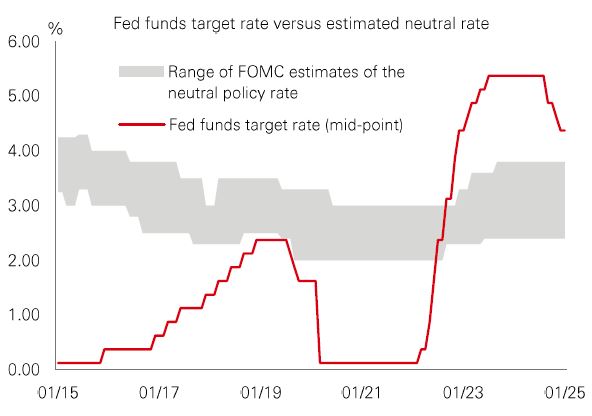
Argentina has seen an extraordinary turnaround. Last year, it delivered its first fiscal surplus since the 2000s after recording a near 7% deficit in 2017. Monthly inflation collapsed from 25% in December 2023 to under 3% a year later. These shifts helped its hard-currency bonds return a staggering 100% in 2024. Despite the shock therapy and its social costs, the government is popular and may win a greater share of representation in Congress in October’s mid-term elections. So far so good. But there are lingering questions about external adjustment. The country has limited ability to meet rising external debt-servicing needs in the coming years. Fear of stoking inflation means its currency can only be devalued gradually via a ‘crawling peg’, limiting the scope for an improvement in the balance of payments. A new deal with the IMF for external financing is in the works but may be delayed until after the mid-term elections. |
Overall, Argentina has an improving structural story. While further reform and IMF funding is needed, it is becoming a fiscal ‘saint’ just as many of its EM peers are turning into fiscal ‘sinners’.
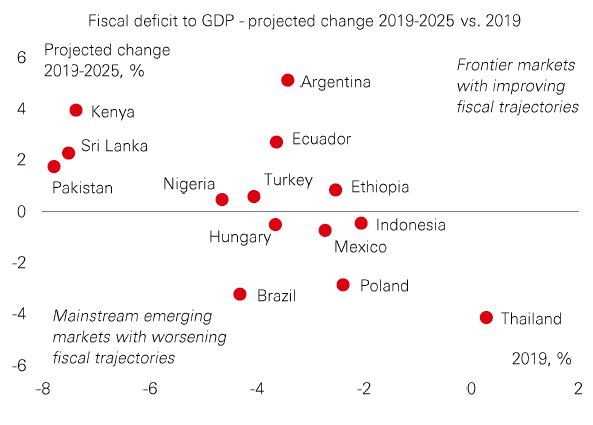
As world leaders and CEOs return from the ski slopes of Davos Klosters, and the recent annual meeting of the World Economic Forum, a key takeaway is that global risk perceptions have shifted dramatically. Topping the list of concerns in this year’s Global Risks Report is ‘state-based armed conflict’ – which barely featured as a risk in the same survey two years ago. Extreme weather, geoeconomic confrontation, mis/disinformation, and societal polarisation together make up the top five fears. AI was also a major talking-point in this year’s discussions, with leaders focusing on its potential to revolutionise industries as well as concerns over economic disruption, job displacement, and regulatory uncertainty – many of which feed into the top risks. |
Broadly, this year’s survey reflects a sense that some of the biggest perceived risks to global stability concern geopolitical tensions and climate change. Some analysts see a shift towards an increasingly multi-polar world where fiscal activism, climate change and technology will dominate. It implies a regime of more volatile inflation and rates amid greater macro uncertainty; more complex asset allocation solutions will likely be required.
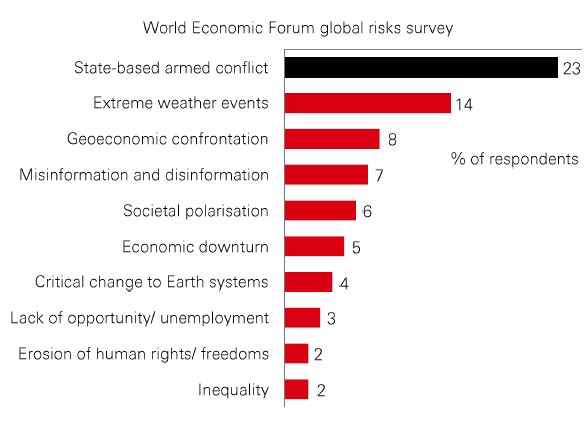
Past performance does not predict future returns. The level of yield is not guaranteed and may rise or fall in the future. For informational purposes only and should not be construed as a recommendation to invest in the specific country, product, strategy, sector, or security. Any views expressed were held at the time of preparation and are subject to change without notice. Any forecast, projection or target where provided is indicative only and is not guaranteed in any way. Index returns assume reinvestment of all distributions and do not reflect fees or expenses. Source: HSBC Asset Management. Macrobond, Bloomberg, Datastream. Data as at 7.30am UK time 31 January 2025.
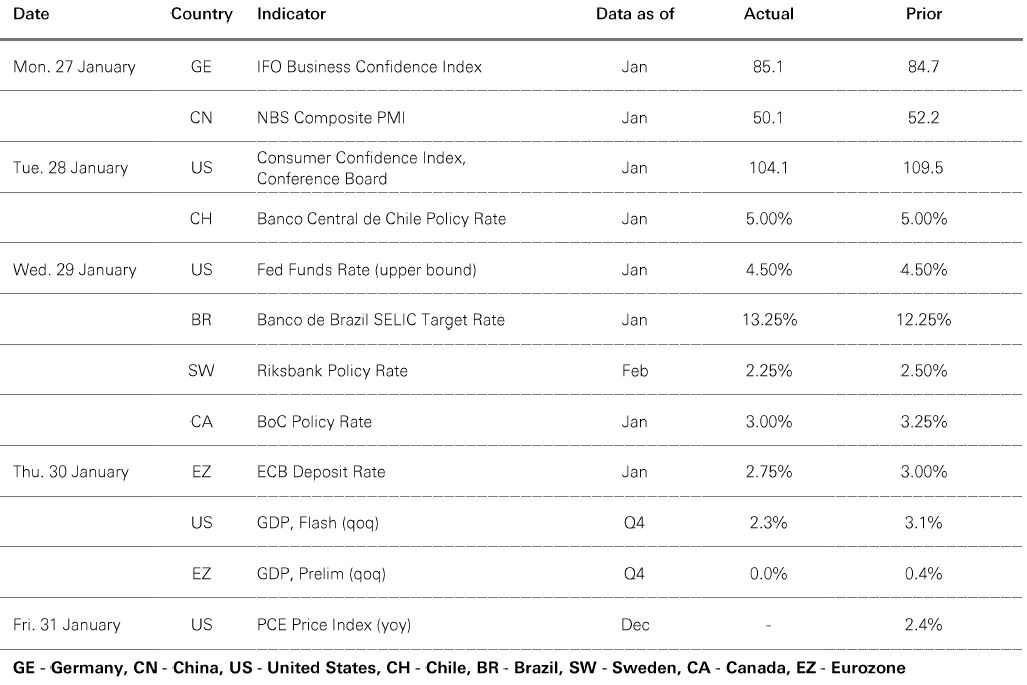
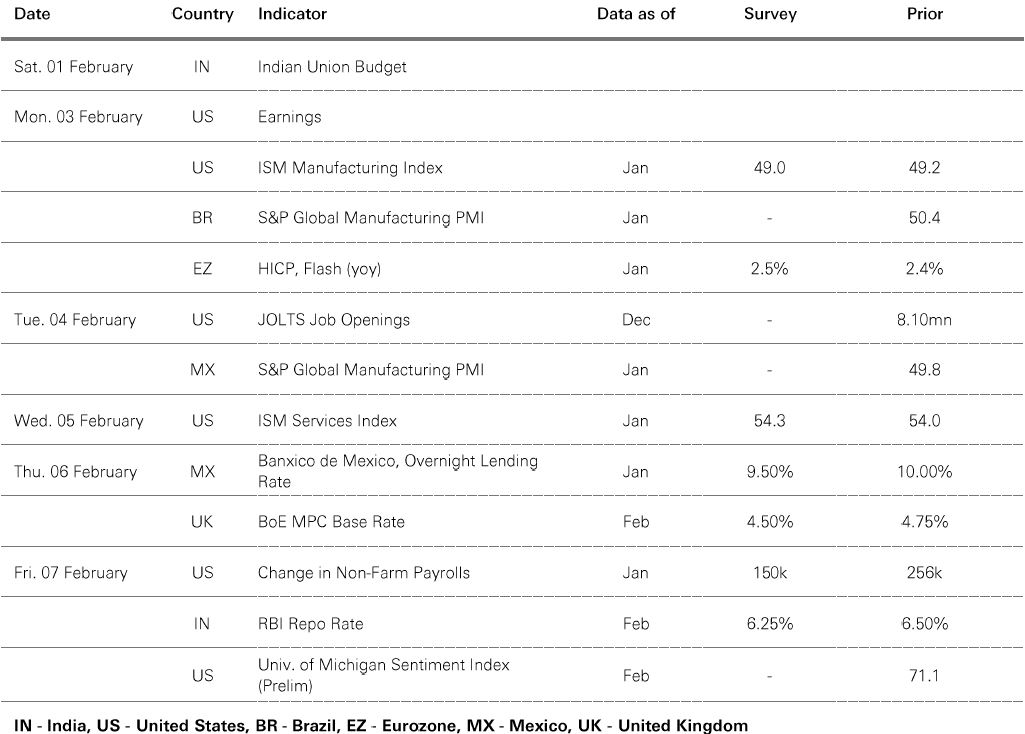
Source: HSBC Asset Management. Data as at 7.30am UK time 31 January 2025. For informational purposes only and should not be construed as a recommendation to invest in the specific country, product, strategy, sector or security. Any views expressed were held at the time of preparation and are subject to change without notice.
Risk appetite soured on an AI-driven sell-off in US big tech and IT stocks early last week, with the US DXY dollar index range-bound. US Treasuries rallied, outperforming Gilts and Bunds. The FOMC left policy unchanged, with Fed chair Powell emphasising “no rush” to alter its policy stance. The ECB lowered rates by 0.25%, with ECB president Lagarde signalling further gradual easing. US equities were mixed as investors digested the latest Q4 earnings updates. The Euro Stoxx rallied further, with Germany’s Dax index reaching a new high. Japan’s Nikkei lost ground as the yen firmed versus the US dollar. In EM, most Asian stock markets were closed for the Lunar New Year holiday, with India’s Sensex eking out a small rise. Brazil’s Bovespa index increased further, with Banco do Brasil hiking rates another 1%. In commodities, oil weakened. Gold and copper were also on course to close higher.




This document or video is prepared by The Hongkong and Shanghai Banking Corporation Limited (‘HBAP’), 1 Queen’s Road Central, Hong Kong. HBAP is incorporated in Hong Kong and is part of the HSBC Group. This document or video is distributed and/or made available, HSBC Bank (China) Company Limited, HSBC Bank (Singapore) Limited, HSBC Bank Middle East Limited (UAE), HSBC UK Bank Plc, HSBC Bank Malaysia Berhad (198401015221 (127776-V))/HSBC Amanah Malaysia Berhad (20080100642 1 (807705-X)), HSBC Bank (Taiwan) Limited, HSBC Bank plc, Jersey Branch, HSBC Bank plc, Guernsey Branch, HSBC Bank plc in the Isle of Man, HSBC Continental Europe, Greece, The Hongkong and Shanghai Banking Corporation Limited, India (HSBC India), HSBC Bank (Vietnam) Limited, PT Bank HSBC Indonesia (HBID), HSBC Bank (Uruguay) S.A. (HSBC Uruguay is authorised and oversought by Banco Central del Uruguay), HBAP Sri Lanka Branch, The Hongkong and Shanghai Banking Corporation Limited – Philippine Branch, HSBC Investment and Insurance Brokerage, Philippines Inc, and HSBC FinTech Services (Shanghai) Company Limited and HSBC Mexico, S.A. Multiple Banking Institution HSBC Financial Group (collectively, the “Distributors”) to their respective clients. This document or video is for general circulation and information purposes only.
The contents of this document or video may not be reproduced or further distributed to any person or entity, whether in whole or in part, for any purpose. This document or video must not be distributed in any jurisdiction where its distribution is unlawful. All non-authorised reproduction or use of this document or video will be the responsibility of the user and may lead to legal proceedings. The material contained in this document or video is for general information purposes only and does not constitute investment research or advice or a recommendation to buy or sell investments. Some of the statements contained in this document or video may be considered forward looking statements which provide current expectations or forecasts of future events. Such forward looking statements are not guarantees of future performance or events and involve risks and uncertainties. Actual results may differ materially from those described in such forward-looking statements as a result of various factors. HBAP and the Distributors do not undertake any obligation to update the forward-looking statements contained herein, or to update the reasons why actual results could differ from those projected in the forward-looking statements. This document or video has no contractual value and is not by any means intended as a solicitation, nor a recommendation for the purchase or sale of any financial instrument in any jurisdiction in which such an offer is not lawful. The views and opinions expressed are based on the HSBC Global Investment Committee at the time of preparation and are subject to change at any time. These views may not necessarily indicate HSBC Asset Management‘s current portfolios’ composition. Individual portfolios managed by HSBC Asset Management primarily reflect individual clients’ objectives, risk preferences, time horizon, and market liquidity.
The value of investments and the income from them can go down as well as up and investors may not get back the amount originally invested. Past performance contained in this document or video is not a reliable indicator of future performance whilst any forecasts, projections and simulations contained herein should not be relied upon as an indication of future results. Where overseas investments are held the rate of currency exchange may cause the value of such investments to go down as well as up. Investments in emerging markets are by their nature higher risk and potentially more volatile than those inherent in some established markets. Economies in emerging markets generally are heavily dependent upon international trade and, accordingly, have been and may continue to be affected adversely by trade barriers, exchange controls, managed adjustments in relative currency values and other protectionist measures imposed or negotiated by the countries with which they trade. These economies also have been and may continue to be affected adversely by economic conditions in the countries in which they trade. Investments are subject to market risks, read all investment related documents carefully.
This document or video provides a high-level overview of the recent economic environment and has been prepared for information purposes only. The views presented are those of HBAP and are based on HBAP’s global views and may not necessarily align with the Distributors’ local views. It has not been prepared in accordance with legal requirements designed to promote the independence of investment research and is not subject to any prohibition on dealing ahead of its dissemination. It is not intended to provide and should not be relied on for accounting, legal or tax advice. Before you make any investment decision, you may wish to consult an independent financial adviser. In the event that you choose not to seek advice from a financial adviser, you should carefully consider whether the investment product is suitable for you. You are advised to obtain appropriate professional advice where necessary.
The accuracy and/or completeness of any third-party information obtained from sources which we believe to be reliable might have not been independently verified, hence Customer must seek from several sources prior to making investment decision.
The following statement is only applicable to HSBC Mexico, S.A. Multiple Banking Institution HSBC Financial Group with regard to how the publication is distributed to its customers: This publication is distributed by Wealth Insights of HSBC México, and its objective is for informational purposes only and should not be interpreted as an offer or invitation to buy or sell any security related to financial instruments, investments or other financial product. This communication is not intended to contain an exhaustive description of the considerations that may be important in making a decision to make any change and/or modification to any product, and what is contained or reflected in this report does not constitute, and is not intended to constitute, nor should it be construed as advice, investment advice or a recommendation, offer or solicitation to buy or sell any service, product, security, merchandise, currency or any other asset.
Receiving parties should not consider this document as a substitute for their own judgment. The past performance of the securities or financial instruments mentioned herein is not necessarily indicative of future results. All information, as well as prices indicated, are subject to change without prior notice; Wealth Insights of HSBC Mexico is not obliged to update or keep it current or to give any notification in the event that the information presented here undergoes any update or change. The securities and investment products described herein may not be suitable for sale in all jurisdictions or may not be suitable for some categories of investors.
The information contained in this communication is derived from a variety of sources deemed reliable; however, its accuracy or completeness cannot be guaranteed. HSBC México will not be responsible for any loss or damage of any kind that may arise from transmission errors, inaccuracies, omissions, changes in market factors or conditions, or any other circumstance beyond the control of HSBC. Different HSBC legal entities may carry out distribution of Wealth Insights internationally in accordance with local regulatory requirements.
Important Information about the Hongkong and Shanghai Banking Corporation Limited, India (“HSBC India”)
HSBC India is a branch of The Hongkong and Shanghai Banking Corporation Limited. HSBC India is a distributor of mutual funds and referrer of investment products from third party entities registered and regulated in India. HSBC India does not distribute investment products to those persons who are either the citizens or residents of United States of America (USA), Canada or New Zealand or any other jurisdiction where such distribution would be contrary to law or regulation.
The following statement is only applicable to HSBC Bank (Taiwan) Limited with regard to how the publication is distributed to its customers: HSBC Bank (Taiwan) Limited (“the Bank”) shall fulfill the fiduciary duty act as a reasonable person once in exercising offering/conducting ordinary care in offering trust services/ business. However, the Bank disclaims any guarantee on the management or operation performance of the trust business.
The following statement is only applicable to PT Bank HSBC Indonesia (“HBID”): PT Bank HSBC Indonesia (“HBID”) is licensed and supervised by Indonesia Financial Services Authority (“OJK”). Customer must understand that historical performance does not guarantee future performance. Investment product that are offered in HBID is third party products, HBID is a selling agent for third party product such as Mutual Fund and Bonds. HBID and HSBC Group (HSBC Holdings Plc and its subsidiaries and associates company or any of its branches) does not guarantee the underlying investment, principal or return on customer investment. Investment in Mutual Funds and Bonds is not covered by the deposit insurance program of the Indonesian Deposit Insurance Corporation (LPS).
Important information on ESG and sustainable investing
Today we finance a number of industries that significantly contribute to greenhouse gas emissions. We have a strategy to help our customers to reduce their emissions and to reduce our own. For more information visit www.hsbc.com/sustainability.
In broad terms “ESG and sustainable investing” products include investment approaches or instruments which consider environmental, social, governance and/or other sustainability factors to varying degrees. Certain instruments we classify as sustainable may be in the process of changing to deliver sustainability outcomes. There is no guarantee that ESG and Sustainable investing products will produce returns similar to those which don’t consider these factors. ESG and Sustainable investing products may diverge from traditional market benchmarks. In addition, there is no standard definition of, or measurement criteria for, ESG and Sustainable investing or the impact of ESG and Sustainable investing products. ESG and Sustainable investing and related impact measurement criteria are (a) highly subjective and (b) may vary significantly across and within sectors.
HSBC may rely on measurement criteria devised and reported by third party providers or issuers. HSBC does not always conduct its own specific due diligence in relation to measurement criteria. There is no guarantee: (a) that the nature of the ESG / sustainability impact or measurement criteria of an investment will be aligned with any particular investor’s sustainability goals; or (b) that the stated level or target level of ESG / sustainability impact will be achieved. ESG and Sustainable investing is an evolving area and new regulations are being developed which will affect how investments can be categorised or labelled. An investment which is considered to fulfil sustainable criteria today may not meet those criteria at some point in the future.
THE CONTENTS OF THIS DOCUMENT OR VIDEO HAVE NOT BEEN REVIEWED BY ANY REGULATORY AUTHORITY IN HONG KONG OR ANY OTHER JURISDICTION. YOU ARE ADVISED TO EXERCISE CAUTION IN RELATION TO THE INVESTMENT AND THIS DOCUMENT OR VIDEO. IF YOU ARE IN DOUBT ABOUT ANY OF THE CONTENTS OF THIS DOCUMENT OR VIDEO, YOU SHOULD OBTAIN INDEPENDENT PROFESSIONAL ADVICE.
© Copyright 2025. The Hongkong and Shanghai Banking Corporation Limited, ALL RIGHTS RESERVED.
No part of this document or video may be reproduced, stored in a retrieval system, or transmitted, on any form or by any means, electronic, mechanical, photocopying, recording or otherwise, without the prior written permission of The Hongkong and Shanghai Banking Corporation Limited.